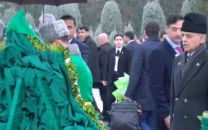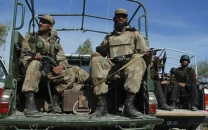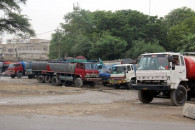Nawaz Sharif’s mysterious U-turn

When the 18th amendment was passed unanimously by the National Assembly – by those present, anyway – it was one of the very few feel-good moments in Pakistan’s sordid political history. Yes, Nawaz Sharif’s mysterious U-turn sullied the process somewhat, but for the most part, Pakistanis could be proud of their political representatives. Yes, there were elements of the reform bill that were less than ideal but on balance, the passage was an unambiguous Good Thing.
So how did we get from mutual pats-on-the-back to burning tires and strikes and antagonistic recrimination in Hazara? Sharif’s unease with the NWFP’s name-change to Pakhtunkhwa was the first step. Because the name change marginalised non-Pashtun populations in NWFP, and because said non-Pashtun populations were centered in Hazara one of the few PML-N strongholds outside Punjab the PML-N did not want to be seen supporting a bill that cemented that marginalisation.
Throwing in the word “Khyber” was evidently enough to assuage Sharif’s concerns, but judging by the PML-Q’s conduct in the last few days, it shouldn’t have been. The moment the bill passed, the PML-Q stepped up its attacks on its erstwhile allies. We were treated to the scarcely believable notion that the PML-Q you still remember their record in power, right? was standing up for the little guy.
Chaudhary Shujaat accused Sharif of selling out the people of Hazara for the opportunity to run for prime minister a third time. The party even called for Hazara to become a separate province, ratcheting up the pressure. It was this fanning of flames by the PML-Q that was directly behind the violence in Hazara, as locals responded to the riling up and took to the streets.
The most important aspect of this episode lies in its demonstration of the differing calculations politicians in Punjab face from everybody else in the country. To see what I’m talking about, let’s assume that we live in a country where what is good for one province or region is bad for another. This assumption is obviously not objectively true, but I would submit that it contorts itself to the ways in which many of our politicians behave on ethno-regional matters (dams, language, civil service jobs and the like).
So if we live in a zero-sum world, then that means our politicians, like all politicians, have to make decisions. If Policy X makes all the As happy but all the Bs unhappy, what would a typical party do? It would weigh up the benefits of making the As happy, the costs of making the Bs unhappy, and then decide whether or not to support Policy X.
Now, if a party has pretensions to national power in any meaningful sense, it usually has to weigh up these costs and benefits carefully. After all, you wouldn’t want to be seen by the rest of the country as only motivated by parochial concerns, because that would ruin your chances of being powerful outside your region. You want to pull off a balancing act: look good to people from your region and the people outside it, as best you can. That’s true for most parties. The problem for Punjabi political parties such as the PML-N and the PML-Q is that their incentives to look good for people outside Punjab are non-existent.
Because Punjab is such a big player in our national politics, and exercises such disproportionate influence, the structural incentives parties face to be ill-concerned with non-Punjabis are too strong.
This is the prism through which we should analyse the PML-Q’s encouragement of the Abbottabad violence, as well as Shahbaz Sharif’s infamous “Leave us alone, Taliban, we’re really the same!” plea. Both actors know how this looks to the rest of the country, and what it does for their popularity outside Punjab, but they go ahead and do it anyway, because being in control in Punjab is so consequential.
When it comes to power in Punjab, you do what you have to do, and worry about ramifications elsewhere later, if at all.
Ahsan Butt frequently appears on Five Rupees.



















COMMENTS
Comments are moderated and generally will be posted if they are on-topic and not abusive.
For more information, please see our Comments FAQ